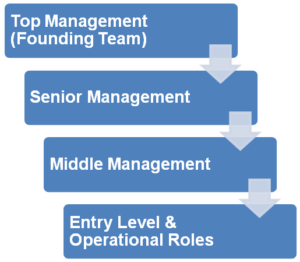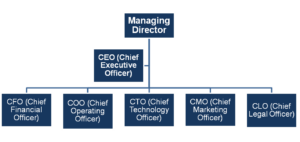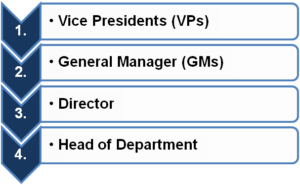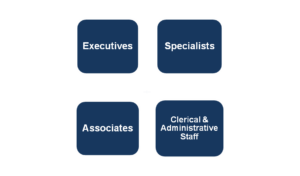
Private Limited Registration is the most popular business structure in India. It has been known for its separate Legal Identity, limited liability, and the ability to raise capital. But do you know about its hierarchy of designations? A proper hierarchical structure is crucial for efficient management & governance & governance within such companies. It will provide us with a clear description of roles, responsibilities, & authority. For a successful future of the business, it is mandatory for the companies to have an accurate managerial structure. In this blog, we will dive into the deep ocean of the complexities of the designation hierarchy within a Private Limited Company Registration in India.
Before moving towards the designation hierarchy, let’s have a quick glimpse at Private Limited Companies-
A private limited company is a business entity that has been owned by its shareholders privately and also has limited liability. You can register your private limited company under the Companies Act 2013 and governed under the MCA, i.e. Ministry of Corporate Affairs. It has been considered a separate legal entity from its owners and is one of the most popular business structures in the country. In order to form a private limited company, there will be requirements of at least 2 shareholders & 2 directors. Additionally, the general public can’t trade the shares of a Pvt Ltd Registration on any stock exchange.
Table of Contents
Hierarchy of Designations of Private Limited Registration
Proper hierarchy in a Private Limited Company Registration has a great impact on its corporate performance & long-term existence. It is crucial to have an appropriate understanding of the company’s hierarchy of designations. The hierarchical structure basically includes the four teams, which are top management (or Founding Team), Senior Management, Middle Management and last, entry-level & operational roles.

Now, we will discuss each designation of a Private Limited Company Registration in India.
Top Management (Founding Team)
At the top designation in a Pvt Ltd Registration is the founding team of the company. It includes the individuals that play a crucial role in the establishment of a company. The top management of a company consists of managing directors & chief executive officers.

Managing Director (MD)
The managing director holds the highest position in a Private Limited Company Registration. A Managing Director is a person who has been appointed by passing a board resolution at a general meeting of the company or as per AOA. We can say that the the Board of Directors appoints the MD .
The managing director of a company is responsible for managing the company. An MD also represents the management system of a Pvt Ltd Company Registration. MD has the power of choosing the other executive & officers with the help of the board of directors. MD also assigns the duties & roles to the other officers & managers.
Chief Executive Officer (CEO)
A CEO i.e. Chief Executive Office holds the position of most senior executive of a company. They have the highest level of authority and have been appointed by the Board of Directors. They are the in charge of designing & implementing the policies & strategies for a Pvt Ltd Company Registration. The CEO is also responsible for making overall decisions including managerial decisions & guiding the other individuals & departments of the Private Ltd Company.
COO (Chief Operating Officer)
After the CEO of a company, COO i.e. Chief Operating Officer comes at the second place. They are responsible for the management of day to day operations of the company. Their main focus is on the successful execution of the business plan made by the CEO of the company. Their responsibility is to supervise & control the Pvt Ltd Registration.
Chief Financial Officer (CFO)
The CFO i.e. Chief Financial Officer of a Private Limited Company Registration in India is responsible for the financial management & monitoring the cash flow of the company. They are the in charge of financial managing, budgeting, managing risk, working capital, funding, and other economic activities of the Pvt Ltd Registration. Their responsibilities also include bookkeeping & accounting, & fundraising.
The CFO of a company also conducts the SWOT (Strengths, Weakness, Opportunities, & Threats) analysis of the company. They have to report to the CEO of the company.
CTO (Chief Technology Officer)
A CTO, i.e. Chief Technology Officer, is a senior executive in the technology department of a private limited company. They are responsible for the management & supervision of the maintenance of the technology & development aspects of the company. They also oversee the development & implementation of the technology strategies of the company.
Chief Legal Officer (CLO)
CLO, i.e. Chief Legal Officer, is the top legal officer of the company who is responsible for handling the legal risks. The main responsibility of a CLO is to provide the regulatory & legal advice to the stakeholders and employees of the Private Limited Company. They are in charge of addressing & managing the legal concerns of a company. They also act as a first person for communication with the authorities.
CMO i.e. Chief Marketing Officer
The CMO i.e. Chief Marketing Officer collaborates with the marketing & sales department to put the marketing strategies & policies into action. They are responsible to manage marketing campaigns, increase marketing revenue, improve the brand image of the company, and many more. The CMO is the in charge of implementing promotional campaigns.
Senior Management
After the top management & founding team, we find the team of senior management. These individuals are responsible for the various operations of a Private Limited Company Registration. They have to report directly to the CEO or other top executives of the company.

-
Vice President (VPs)
The Vice President of a Private Limited Company is to supervise the specific departments or functions including sales, marketing, finance, as well as human resources.
-
General Manager
Usually, a general manager of company is in charge of a specific business unit or division within the Private Limited Company.
-
Directors
Directors are responsible to manage the specific teams or projects of the company. They have to report to the Vice President or General Manager of the company.
-
Head of Departments
Head of a Department is a person who has been appointed in order to manage the day to day operations within their respective departments including HR, IT, Finance, or any other department.
Medium Management
Medium management of a company works as a bridge between the senior management & lower level employees. The individuals included in middle management are responsible for the implementation of strategies that have been set by the seniors. They also make sure that the daily operations will run smoothly.

-
Managers
The major role of the managers of a company is the supervision of the various teams & departments. They have the responsibility of achieving the specific targets & goals that have been set by the seniors.
-
Team Leaders
The team leaders have to supervise the smaller teams within a department. It is also their responsibility to make sure that all the team members have work properly & efficiently.
-
Project Managers
The major responsibility of the project managers is planning, managing, & executing the specific projects of the private limited company.
Entry Level & Operational Roles
The entry level staff members are responsible for the day to day tasks of a private limited company. This group includes a number of roles.

-
Executives
They are the entry level employees and hold the title of executive assistance, or executive trainee. They collaborate with the senior management in order to fulfill the daily operations of the company.
-
Specialists
These are the technical staff that possesses the expertise in some specific areas like IT, finance, or marketing in order to support the respective departments. Basically, it includes engineers, IT Professionals & other technical experts who help in the development & maintenance of the products & services of the company.
-
Associates
You can say that associates are the junior employees who perform the tasks that the managers or team leaders have assigned.
-
Clerical & Administrative Staff
They are the employees who have the responsibility of handling the administrative tasks, including data entry, receptionist duties, and also the management & maintenance of the office.
Final Words
It is very crucial for the proper governance, management, and operations of a Pvt Ltd Registration to understand the hierarchy of the designations in the company. Each & every person plays a vital role in the success of the company. The proper hierarchical structure not just promotes the clear communication & decision-making but also helps in distributing the roles, responsibilities, as well as accountability across the organization. It will make sure about the smooth functioning of the company. With its help a private limited company can operate efficiently. It will be very helpful to get succeed today’s competitive business landscape to understand this hierarchical structure, whether you are an investor, employee, or aspiring entrepreneur. You can also seek the expert guidance of professionals like Legal Pillers who helps you in formulating the perfect top to lower management hierarchy in order to achieve the goals, sustainability, and growth of the company.
Choose Legal Pillers as your trusted partners to register Pvt Ltd Company online effortlessly & successfully.
Other Related Blogs
- Company Registration Process
- Benefits of Company Registration
- A Beginner’s Guide to Private Limited Company Registration
- Documents required for Company Registration
- Types of Company Registration for Business Registration
- OPC Registration Online in India
- The Advantages and Procedures of Online Company Registration for New Businesses and Entrepreneurs
- The Benefits and Process of Private Limited Registration for Your Business
- The Benefits and Process of Section 8 Company Registration Online
- How Much Does It Cost For Pvt Ltd Company Registration Online in India?
- How to convert Sole Proprietorship into Pvt Ltd Company Registration?
- ROC Compliances for Private Limited Companies
- Differentiate Between LLP and Private Limited Company Registration
- Documents Required for Section 8 Company Registration Online (Section 8 NGO)
- How to Check the Name Availability for Online Company Registration in India?
- Disadvantages of Private Limited Registration
- Funding Options for the Registration of Private Limited Company
- Sole Proprietorship vs One Person Company Registration
- Benefits of OPC Registration in India
- Step-By-Step Guide to Convert a Pvt Ltd Company into OPC Registration Online
- How to Change the Nominee of One Person Company Registration Online?
- How to Convert Sole Proprietorship into OPC Online Registration?



Leave a Reply